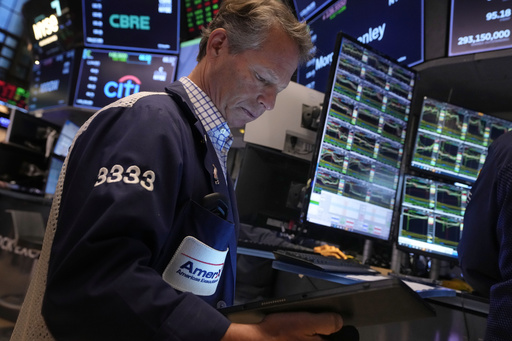
BANGKOK — Asian stock markets opened the week with mixed outcomes following significant losses in U.S. shares, marking the worst decline seen since the recent presidential election.
In Japan, the Nikkei 225 index fell by 1%, settling at 38,255.65. This drop occurred as the yen regained strength against the U.S. dollar. The Bank of Japan’s governor, Kazuo Ueda, has indicated that interest rates will be raised moving forward as economic conditions allow. The dollar traded lower at 154.46 yen, down from 154.54 yen recorded late Friday, having previously been above 156 yen during the last week.
South Korea’s Kospi index rose by 2% to 2,465.60, buoyed by Samsung Electronics’ announcement of a share buyback program, resulting in a 6% rise in the company’s shares.
Chinese markets also saw gains, with Hong Kong’s Hang Seng index increasing by 1.2% to reach 19,655.58, and the Shanghai Composite index also climbing by 1.2% to 3,372.18. The uptick in retail spending noted in recent data has led economists to suggest that the government’s stimulus measures are beginning to stimulate the otherwise stagnant economy.
Additional markets in Asia displayed varied performances, as Australia’s S&P/ASX 200 edged up by 0.1% to finish at 8,295.40. Conversely, Taiwan’s Taiex dropped 0.8%, while the SET index in Bangkok rose by 0.6%.
In the United States, Friday marked a tumultuous day for stocks, as markets reeled from the fading momentum following the “Trump bump” associated with the recent presidential election and the Federal Reserve’s rate cuts.
The S&P 500 index plummeted by 1.3% to finish at 5,870.62, marking its worst performance since before the elections, contributing to an unsteady week. The Dow Jones Industrial Average declined by 0.7% to 43,444.99, and the Nasdaq composite fell dramatically by 2.2% to 18,680.12.
The decline was significantly influenced by vaccine manufacturers, particularly after President-elect Donald Trump proposed Robert F. Kennedy Jr., an anti-vaccine advocate, to lead the Department of Health and Human Services. This announcement led to a drop in shares of Moderna by 7.3% and a 4.7% decrease for Pfizer, both firms facing concerns regarding potential impacts on their profitability.
However, Kennedy’s appointment still requires Senate confirmation, and many analysts remain doubtful about his likelihood of securing the role.
Broad declines were seen among biotech stocks, but the most significant loss within the S&P 500 was reported by Applied Materials, which fell by 9.2%. Despite announcing an unexpected profit for the latest quarter, the company provided revenue forecasts that did not meet analysts’ anticipations.
With stock prices soaring faster than earnings, companies are under pressure to demonstrate substantial growth, leading some to consider the current stock market overheated. The S&P 500 continues to show a 23% increase for the year, closely approaching its record high achieved on Monday, despite last week’s setbacks.
Since Trump’s election victory, stock markets have generally surged, triggered by investor optimism over his proposals for higher tariffs, lower tax rates, and less regulation, which spurred increased purchasing in bank stocks, smaller U.S. companies, as well as cryptocurrencies.
Nonetheless, investors are now weighing the possible adverse impacts of Trump’s policies, especially concerns regarding escalation in the U.S. government deficits and rising inflation. This caution has led traders to reconsider the extent of monetary relief the Federal Reserve could offer in the coming year through interest rate cuts. Earlier this month, the Fed had already cut its primary interest rate for the second time in 2023, with prior forecasts suggesting more reductions could happen through 2025.
Fed Chair Jerome Powell hinted at a careful approach towards future interest rate decisions, stating that the economy is not signaling an urgent need for rate cuts; he, however, refrained from commenting on how Trump’s prospective policies might affect this outlook.
A report released on Friday revealed that consumer spending at U.S. retailers for the previous month surpassed expectations, indicating that this critical economic driver remains robust.
Early Monday trading saw U.S. benchmark crude oil futures rise by 17 cents to $67.19 per barrel on the New York Mercantile Exchange, while Brent crude experienced a 29-cent increase to reach $71.33 per barrel.
The euro was valued at $1.0539, showing a slight increase from $1.0534 noted late Friday.
